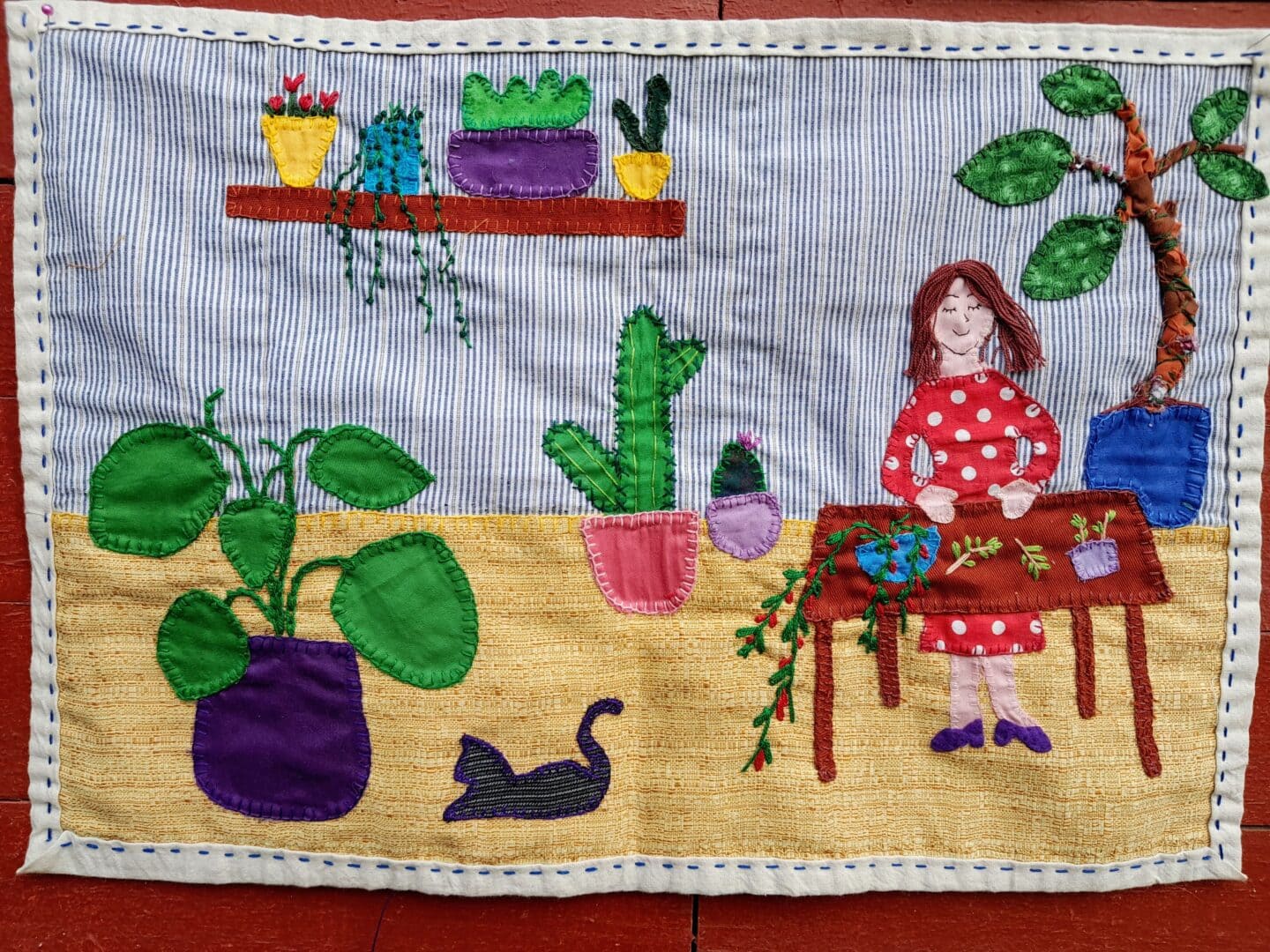
October 14th, 2023
12 pm – 4 pm ET
Located at Blue The TATTER Textile Library – Brooklyn, NY
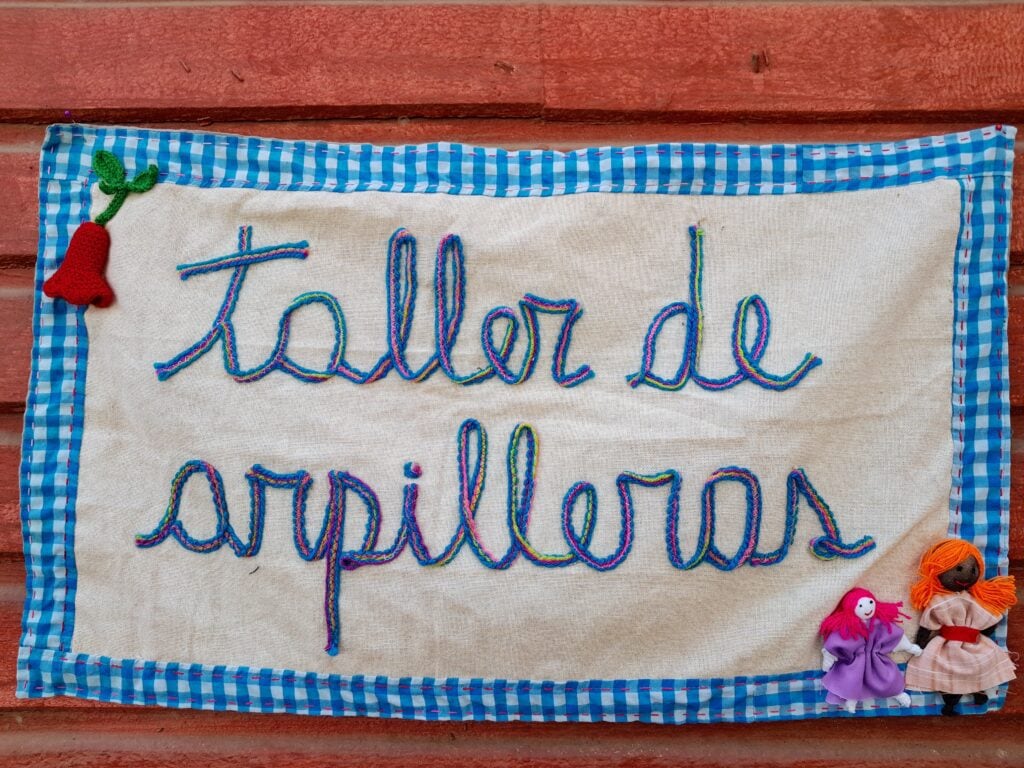
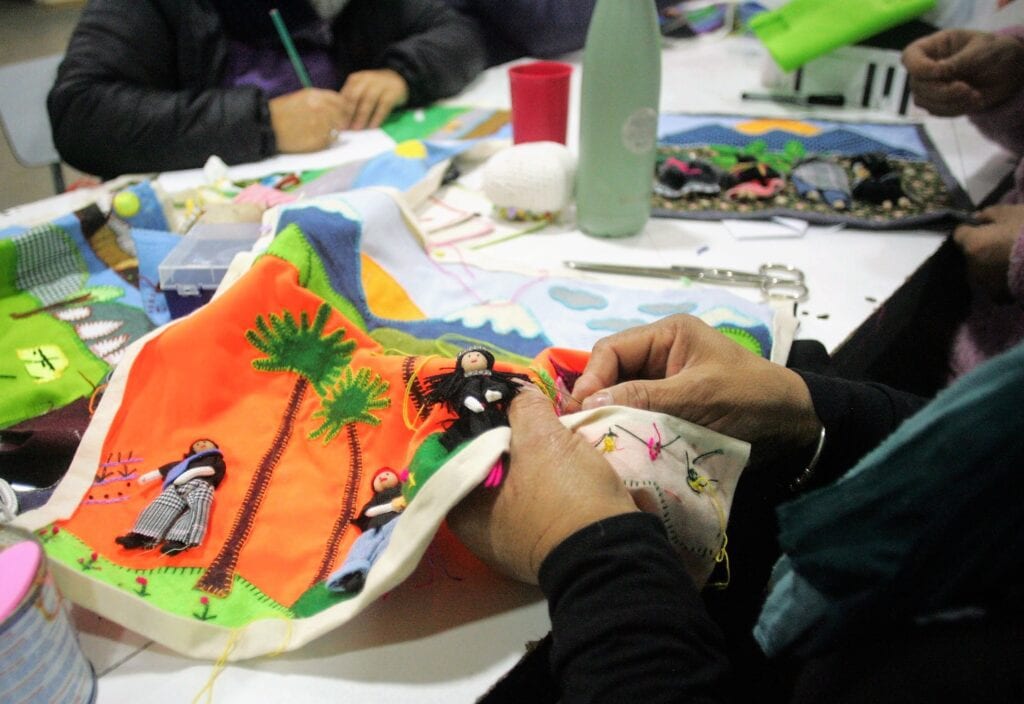



Ticket includes all necessary materials. Students will leave the workshop with a deep understanding of the history of Chilean Arpilleras, new stitching techniques to experiment with, and a started project of their own.
ACTIVITY
“Arpillera” in English loosely translates to burlap- descriptive of the common substrate fabric on which colorful, narrative compositions native to Chile, are appliquéd.
However bright and lyrical these compositions may be, the legacy of Chilean Arpilleras is one of politics, deeply personal story, and lived trauma.
The practice of Arpilleras was established in Chile in the 70s, during the dictatorship of Augusto Pinochet. In those trying times, human rights violations were a daily occurrence. Many families knew torture, illegal detentions, and murders first hand. To this day, there are families searching for the remains of their parents, spouses, and children.
As we see time and time again, deep suffering can be the seed of profound resilience. An organization called the Vicaría de la Solidaridad, began to provide moral and legal support, primarily to female relatives of victims of abuse, detainees, and missing people. These women spent much of their time in offices, waiting for information from their relatives. It was there, under the guidance of a leader named Valentina Bonne, where the first Arpillera workshop began. With very few materials, they began to embroider and transfer their pain, anguish, and grief to the fabric. Their needle and thread told their stories.
These textiles acted as newspapers, eventually traveling across borders and opening the public eye to the human right violations taking place throughout the country. The Arpilleras were considered subversive material, forcing the women who made them to embroider in secret. Few Arpilleras were signed, in an effort to protect the identity of the makers.
In addition to their intense political history, the making of an Arpillera offers the embroider a chance to join this fabric legacy and share one’s own personal story. Cathartic and expansive, this practice bonds makers together, while empowering them to translate lived experience into art.
Join Scarlett Yàvar Garcia, as she highlights the importance of Arpilleras throughout Chilean history, explores the ways in which these textiles have been cast aside as “women’s work” despite their profound social impact, and encourages folks from all over the world to engage in this form of storytelling.
“It is in our hands, in our needles and threads, that the history of these women is not lost.” – Scarlett Yàvar Garcia”
LOCATION
BLUE, The TATTER Textile Library is located in Gowanus, Brooklyn. Serving as both an interactive, ongoing art-installation as well as an academic research library, BLUE is an ever-growing home to 6,000 books, journals, exhibition catalogs, and objects that examine and celebrate the global history, traditions, makers, craft and beauty of textiles.
Dates
October 14th, 2023
12 pm – 4 pm ET
Location
This workshop will take place at the TATTER Textile Library in Brooklyn, NY.
Cost
$200
Scholarships
This workshop is open, free of charge, to all people of Chilean descent. There are also three scholarship spots. If interested in a scholarship, please email an application letter to [email protected]. Please tell us about your creative practice, why you are drawn to this class, and what you hope to get out of it.
Texto en Español
“Arpillera” en inglés se traduce libremente como arpillera, descriptiva de la tela de sustrato común sobre la cual se aplican composiciones narrativas coloridas nativas de Chile.
Por muy brillantes y líricas que puedan ser estas composiciones, el legado de las arpilleras chilenas es uno de política, una historia profundamente personal y un trauma vivido.
La práctica de las arpilleras se instauró en Chile en la década del 70, durante la dictadura de Augusto Pinochet. En aquellos tiempos difíciles, las violaciones de los derechos humanos eran algo cotidiano. Muchas familias conocieron de primera mano torturas, detenciones ilegales y asesinatos. Hasta el día de hoy, hay familias que buscan los restos de sus padres, cónyuges e hijos.
Como vemos una y otra vez, el sufrimiento profundo puede ser la semilla de una resiliencia profunda. Una organización llamada Vicaría de la Solidaridad, comenzó a brindar apoyo moral y legal, principalmente a mujeres familiares de víctimas de abuso, detenidos y desaparecidos. Estas mujeres pasaban gran parte de su tiempo en aquellas oficinas, esperando información de sus familiares. Fue allí, bajo la dirección de Valentina Bonne, donde se inició el primer taller de Arpillera. Con muy pocos materiales comenzaron a bordar y trasladar su dolor, angustia y pena a la tela. Su aguja e hilo contaron sus historias.
Estos textiles actuaron como periódicos, eventualmente viajando a través de las fronteras y abriendo los ojos del público a las violaciones de los derechos humanos que tienen lugar en todo el país. Las arpilleras eran consideradas material subversivo, obligando a las mujeres que las confeccionaban a bordar en secreto. Se firmaron pocas arpilleras, en un esfuerzo por proteger la identidad de los creadores.
Además de su intensa historia política, la confección de una arpillera ofrece a la bordadora la oportunidad de sumarse a este legado de tejido y compartir su propia historia personal. Catártica y expansiva, esta práctica une a los creadores, al tiempo que los empodera para traducir la experiencia vivida en arte.
Únase a Scarlett Yàvar García, mientras destaca la importancia de las arpilleras a lo largo de la historia chilena, explora las formas en que estos textiles han sido dejados de lado como “obras de mujeres” a pesar de su profundo impacto social, y alienta a personas de todo el mundo a participar en esta forma de narración.
“Está en nuestras manos, en nuestras agujas e hilos, que la historia de estas mujeres no se pierda”. – Scarlett Yavar García”
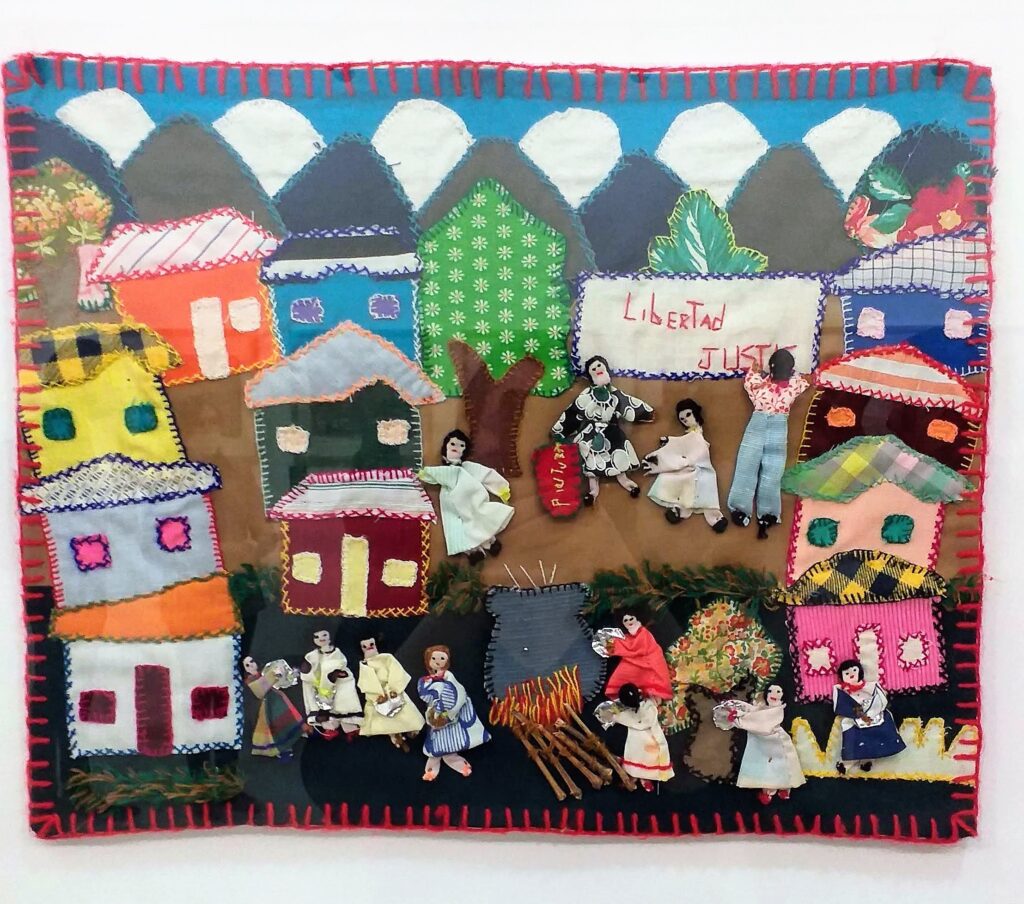
The Museum of Memory, Olla Común, 1973-1990, Tela y bordado 38 x 48 x 1,5 cm, Colección Rosemary Baxter, Museo de la Memoria y los Derechos Humanos, 9
January 2023.
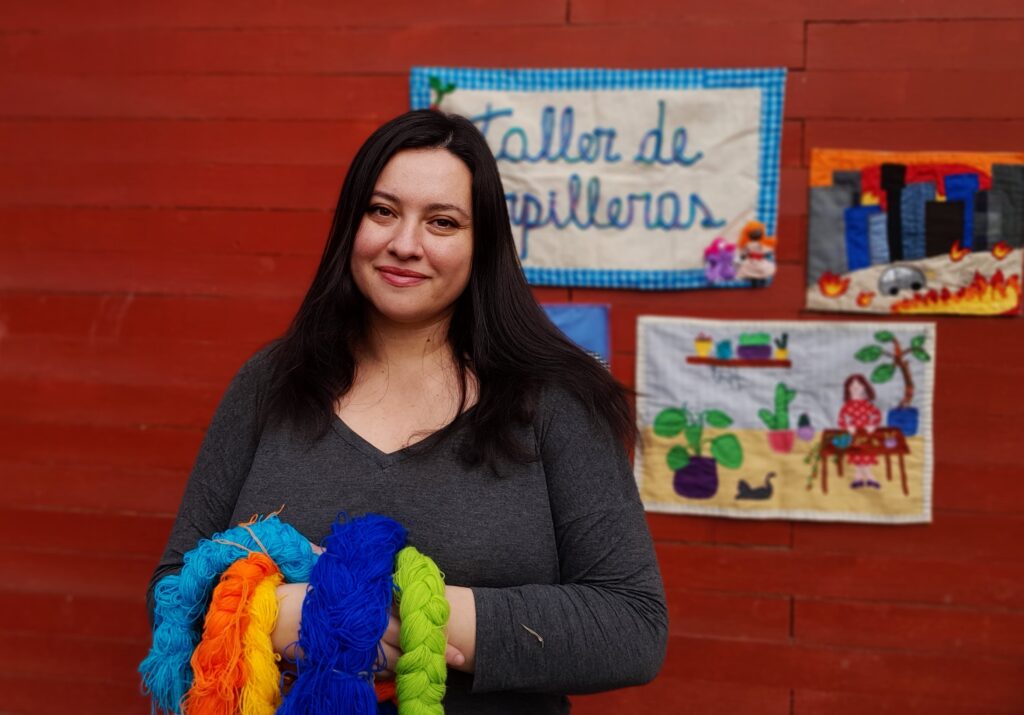
Scarlett Yàvar Garcia is a self-taught textile artist, dedicated to developing, researching and disseminating textile techniques, with a focus on quilting and Chilean arpilleras. Throughout her creative journey, she has approached her work with a mindfulness of sustainability and reuse. Maintaining a practice of “slow sewing”, she has found that she falls in love with the process even more than the results. Over the last few years, she has dedicated herself to teaching textile techniques to different communities in Santiago de Chile, where she lives. It is important to Scarlett to share stitching traditions and practice with residents who are outside of modern social networks and the online education community. When she is not teaching, she dedicates her time to the development of her work and experimentation within it.
